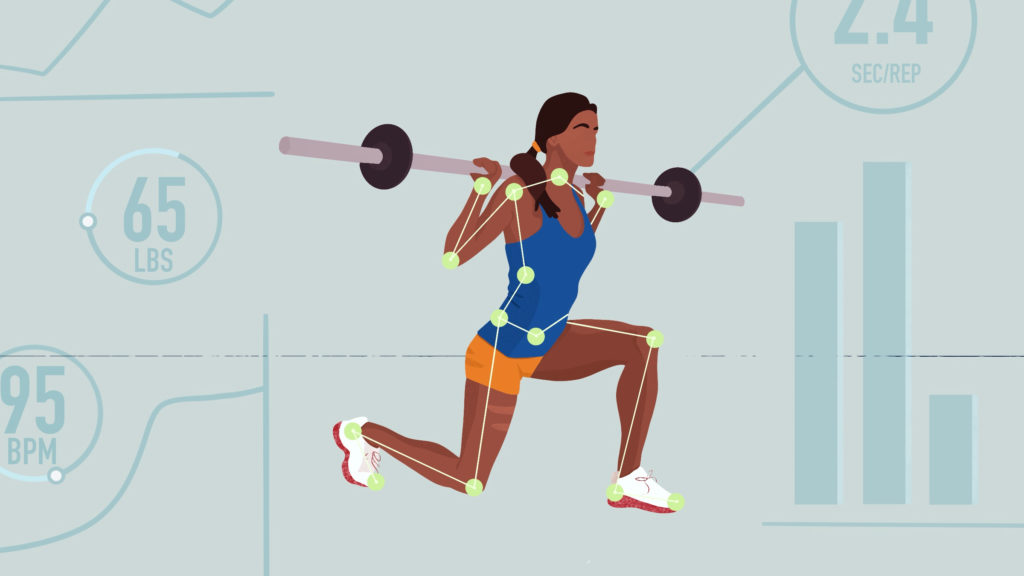Going beyond cardio equipment and boutique-style classes, strength training is the next frontier of connected fitness.
In the news: Last week, Tonal raised $250M in Series E funding, valuing the company at $1.6B. Giving chase, Tempo is reportedly finalizing an investment of more than $100M from SoftBank.
Zooming out: The smart strength category is bulking up as connected equipment makers and investors plot their next move.
Starting Up
For Tonal, the journey to becoming a billion-dollar brand began in 2015. That’s when Aly Orady started Ript Labs (as the company was originally known).
An engineer turned entrepreneur, Orady struggled with his weight, developing Type 2 diabetes and sleep apnea. Thanks in part to strength training, he lost 70lbs.
While at the gym, Orady had an idea…
Staring at a strength training machine, Orady wondered if he could use electromagnets to generate force, eliminating the need for bulky equipment. By shrinking the footprint and using workout-tracking software, Orady hoped to revolutionize strength training.
After some tinkering, Orady developed a crude prototype. With work, the digital resistance began to feel like actual weights. But further improvements would be costly, requiring outside capital.
For months, Orady pitched would-be investors to no avail. Eventually, in 2016, he landed $1.5M in seed funding from Mayfield and Bolt Ventures.
With funding secured, Orady honed the concept into a wall-mounted machine.
A nod to Paul Graham’s “do things that don’t scale,” the team rented an apartment in San Francisco where alpha users tested a prototype in exchange for feedback. Later, beta users tested home units during a year-long trial.
Over three-plus years, Ript Labs raised more than $40M before rebranding to Tonal. In 2018, the newly named company launched publicly. Since then, Tonal has added more than $400M in funding, helping it dominate the smart strength category.
“The rowers on the market, the bikes, the treadmills, they’re not all that dissimilar from their predecessors… We didn’t just add an Android tablet to an existing strength training machine; we reinvented it from the ground up.” – Tonal CEO Aly Orady
According to Tonal, it has “90% market share” in connected strength. And, on average, members work out for ~40 minutes every other day. More interesting, 25% of Tonal users also own a connected cardio device.
Without disclosing revenue figures, sales are said to have increased 800% last year. Now, Orady is focused on scaling the business while preparing for an IPO.
Keeping Pace
Trailing Tonal, Tempo has emerged as a smart strength contender.
While Tonal employs digital resistance, Tempo relies on standard weights. The hook? The device uses 3D sensors and AI to analyze form in real time.
Technically, Tempo launched in February 2020. But work began in 2015.
Despite countless iterations, the vision created by founder Moawia Eldeeb remained true: to democratize personal training.
“My whole life has been shaped by training. Both the way trainers have helped me, and through my own work as a personal trainer.” – Tempo CEO Moawia Eldeeb
After immigrating to New York from Egypt and ending up homeless, Eldeeb landed at a local YMCA. There, he found a supportive community and a steady job as a personal trainer. The gig helped Eldeeb pay his way through Columbia, where he met his co-founder, Josh Augustin.
Initially, the pair combined a camera and screen to create a virtual trainer. Known as SmartSpot, the company was accepted into Y Combinator before raising $1.85M in seed funding.
A B2B model, the $2,500 device was sold to gyms, where members used it for free. After some initial traction, gyms turned on SmartSpot. The fear? Members would use the screen instead of paying for personal training.
Shut out from gyms, the company went direct-to-consumer. In July 2019, armed with $17M in funding, SmartSpot reemerged as Pivot. But before releasing a product, the company rebranded again, debuting as Tempo early last year.
By July 2020, bolstered by the lockdowns, Tempo projected a $100M run rate for the year. Taking notice, General Catalyst and Norwest Venture Partners led the company’s $60M Series B at a $250M valuation.
“We were enamored by the founding team, their vision, and their resiliency… Tempo has true platform characteristics and technology advantage, leveraging data and AI.” – General Catalyst’s Holly Maloney on the Fitt Insider podcast
Now, Tempo is said to be finalizing an investment of more than $100M from SoftBank — a cash injection that would fortify the company’s war chest for the smart strength land grab.
Smart Strength
While cardio equipment and live/on-demand fitness content are two highly competitive categories, smart strength is shaping up.
Combining Tonal’s strength setup with a MIRROR-like screen and content, FORME Life could be the best of both worlds. But, the company isn’t shipping product yet.
A pre-launch product, OxeFit raised $12.5M from Lydia Partners and Dallas Cowboys quarterback Dak Prescott, among other athlete-investors.
Offering connected weights and a high-def screen, JAXJOX is a smart strength studio with $17M in funding.
NordicTrack’s Vault is a screen and locker for weights. And Fusion is… massive.
Going screenless, ARENA is a slimmed-down unit that weighs less than 40lbs but generates more than 200lbs of resistance. Units begin shipping this spring.
Also screen-free, Vitruvian packs 400lbs of resistance into a 65lb platform using motors and drives to generate force.
And Carbon Trainer is a Tempo-like product aimed at more serious weightlifters.
Beyond hardware, Perch and PUSH tap computer vision and sensors to optimize strength training. Elsewhere, Future, TrueCoach, Caliber, and DeltaTrainer are making personal training more accessible. Further, apps like fitbot and FitnessAI are using artificial intelligence to create personalized strength training programs.
Punchline: As demand grows for options beyond cardio and class-based content, smart or not, the strength training category has never been stronger. This fact will lead to further innovation in the sector while setting the stage for potential acquisitions as companies look to expand their connected fitness offerings.
🎙 On the Podcast
This week, on the Fitt Insider podcast, we’re joined by Greg Caplan, co-founder and CEO of Spot Meetings — a platform for walking meetings.
In this episode, we discuss:
- The “aha!” moment that led Greg to start Spot
- Designing a hands-free platform for walking meetings
- The health and productivity benefits of walking more
- Launching Spot’s beta and amassing a waitlist of 5K people
Listen to the full episode here.
*Disclosure: We’re excited to be investors in Spot, supporting the company on its mission to help people escape Zoom fatigue and be more physically active.
🧐 The Road to Reopening
Will a return to gyms and studios end the at-home workout boom?
On one hand, citing the power of community and our longing for social interaction, some onlookers expect members to rush back to gyms.
- Planet Fitness aims to open 100 gyms this year, investing heavily in advertising and its digital offering.
- Life Time expects to hire 800 personal trainers in the coming months after cutting staff last year.
- Orangetheory Fitness recently said: 90% of its studios are open, and 70% of members have returned for in-person classes.
On the other hand, connected fitness operators aren’t worried:
Tonal CEO Aly Orady: “We don’t believe that people were switching to at-home-fitness temporarily during COVID and intended to go to gyms. It’s accelerated a shift in people’s mindset toward working out at home.”
MIRROR CEO Brynn Putnam: “The home will always be the most convenient place to work out.”
Peloton CEO John Foley: “We still have not seen any softening since that vaccine was announced and since the vaccine has been rolling out. So, other than investors getting nervous, the consumers are still feeling like they want to work out at home.”
Early indications suggest that members aren’t in a hurry to return.
According to RunRepeat, more would-be gym-goers are canceling their memberships now (29.8%) than during the initial lockdown period (12.4%). Worse, 35% of US gym members say they won’t return to in-person exercise.
Looking ahead, gyms and studios hope to rebound from a devastating year that saw 17% of all US fitness locations close as industry-wide revenue declined by 58%.
For now, the future of fitness in a post-pandemic world is still TBD.
🧠 Raising the Bar
Nutrition bars are big business, especially the high-protein and meal replacement varieties. But, new entrants are focused on functional ingredients.
In recent years, bar brands made bank.
- Kellogg’s paid $600M for RXBAR.
- Hershey bought ONE Brands for $397M.
- Simply Good Foods acquired Quest Nutrition for $1B.
- Mondelēz spent $277M on Grenade, a UK-based bar maker.
Now, a new batch of bars is doubling down on brain health.
Brain Food. As we detailed in Issue No. 49, the global brain health market is expected to reach $11.6B by 2024. And the nootropics category could reach $6B by 2024. Taking notice, upstarts are creating brain health bars.
- Rob Dyrdek and Joe Jonas invested in Mindright’s nootropic bars.
- IQBAR landed a $2.8M investment from CircleUp Growth Partners.
- TruBrain says its bars “boost mental output.”
- myAir raised $2M for stress-reducing bars made using machine learning.
Next up: Bar makers are turning their attention to gut issues. To that end, Healright developed a micronutrient-dense food solution that supports gut health. And BelliWelli recently secured $1M for its low-FODMAP snack bars.
💰 Money Moves
- Tonal, a connected strength training company, closed $250M in funding, valuing the business at $1.6B.
Listen in: Tonal CEO Aly Orady on the Fitt Insider podcast - Hologram Sciences, a personalized nutrition startup, launched with $100M in funding from Royal DSM.
More from Fitt Insider: The Trillion-Dollar Nutrition Question - Real, a mental healthcare company, raised $10M in Series A financing, led by Lightspeed Venture Partners.
More from Fitt Insider: Peak Burnout - Cleo, a family benefits platform, raised a $40M Series C investment led by Transformation Capital.
More from Fitt Insider: Femtech 2.0 - London-based blood sensing startup Zedsen secured $12M in Series B funding.
- Disco, a men’s skincare brand, raised $5M in seed funding led by Midnight Venture Partners.
More from Fitt Insider: What’s Next in Men’s Wellness - FORTË, a live streaming workout platform, closed $4M in funding led by SeventySix Capital.
Listen in: FORTË CEO Lauren Foundos on the Fitt Insider podcast - Exakt Health, a Berlin-based digital physiotherapy coach for sports injuries, completed a $500K funding round.
More from Fitt Insider: The Big Business of Recovery - Mantra Health, a digital mental health clinic for higher education institutions, added $2M to its seed round for a total of $5.2M in funding to date.
- Moju, a functional beverage brand, raised £2.5M ($3.45M) from Danone Manifesto Ventures.
- Super League Triathlon, a multi-sport race series, acquired Racecheck, a race review and registration platform.
More from Fitt Insider: The Rise of Virtual Races - IBH, a tech-enabled population health platform, acquired Uprise, a digital mental health company.
- Béa Fertility, a UK-based at-home fertility startup, raised a pre-Series A round of $1M.
- Nike-backed HandsFree Labs, makers of hands-free footwear technology, secured $3M in funding.
- Olive Union, a smart hearing aid startup, closed a $7M Series B.






